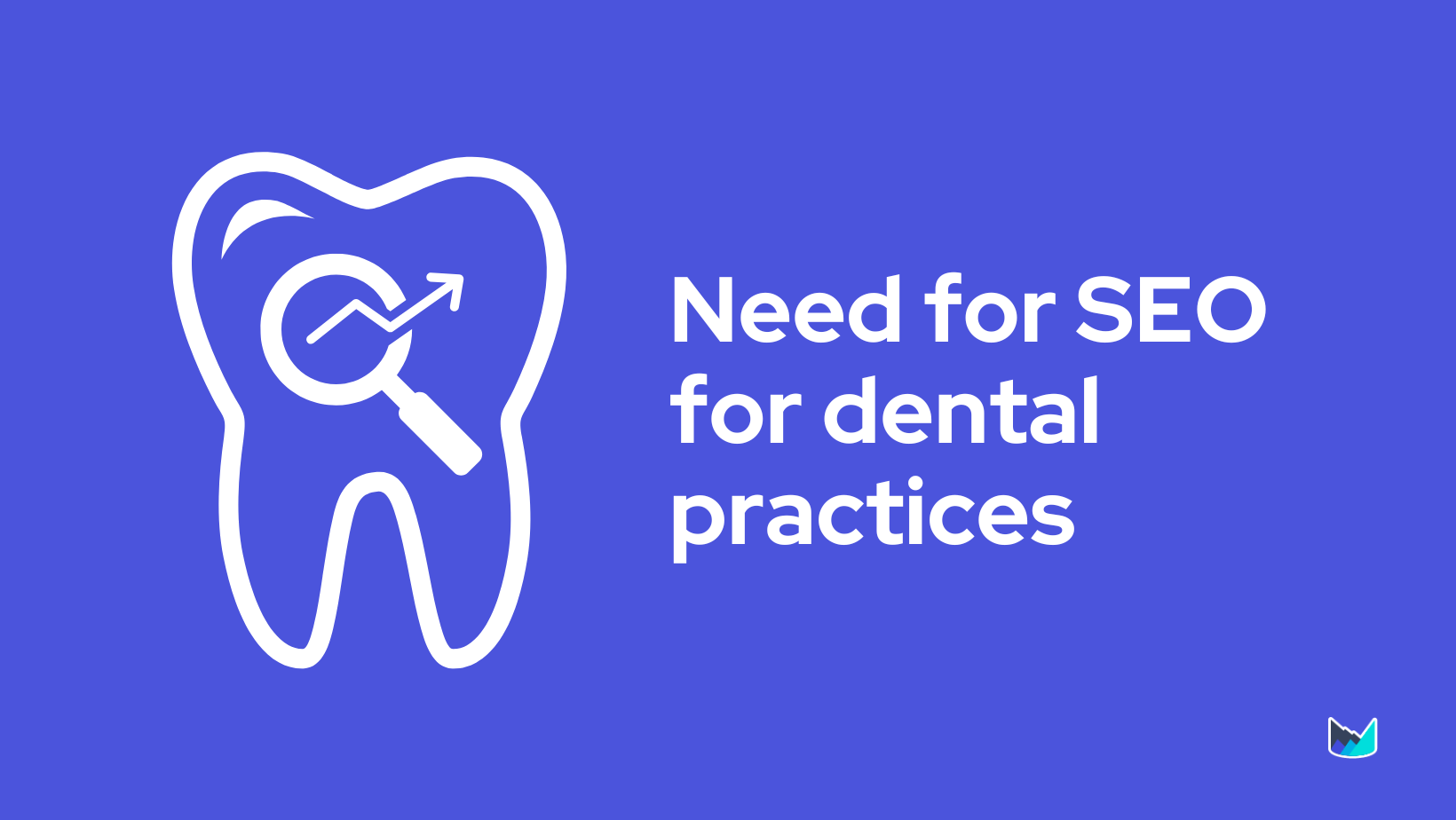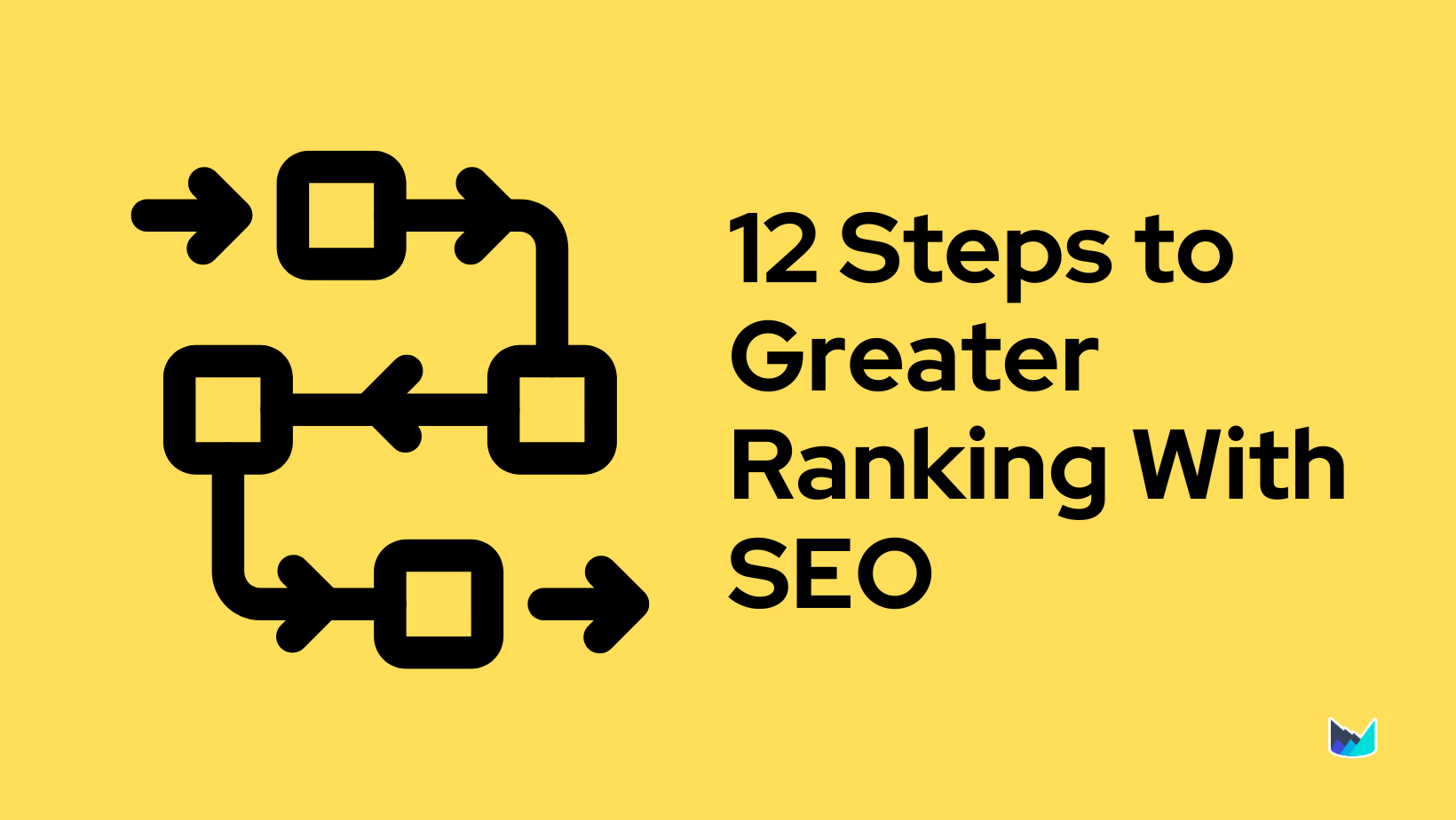- Product
- SEO Content Editor
- SEO Content Strategy
- Content Optimization
- Content Briefs
- AI Assisted Writing
- Keywords Clustering
Preview a demo walkthrough
Outranking the competition with our cutting-edge SEO strategies.
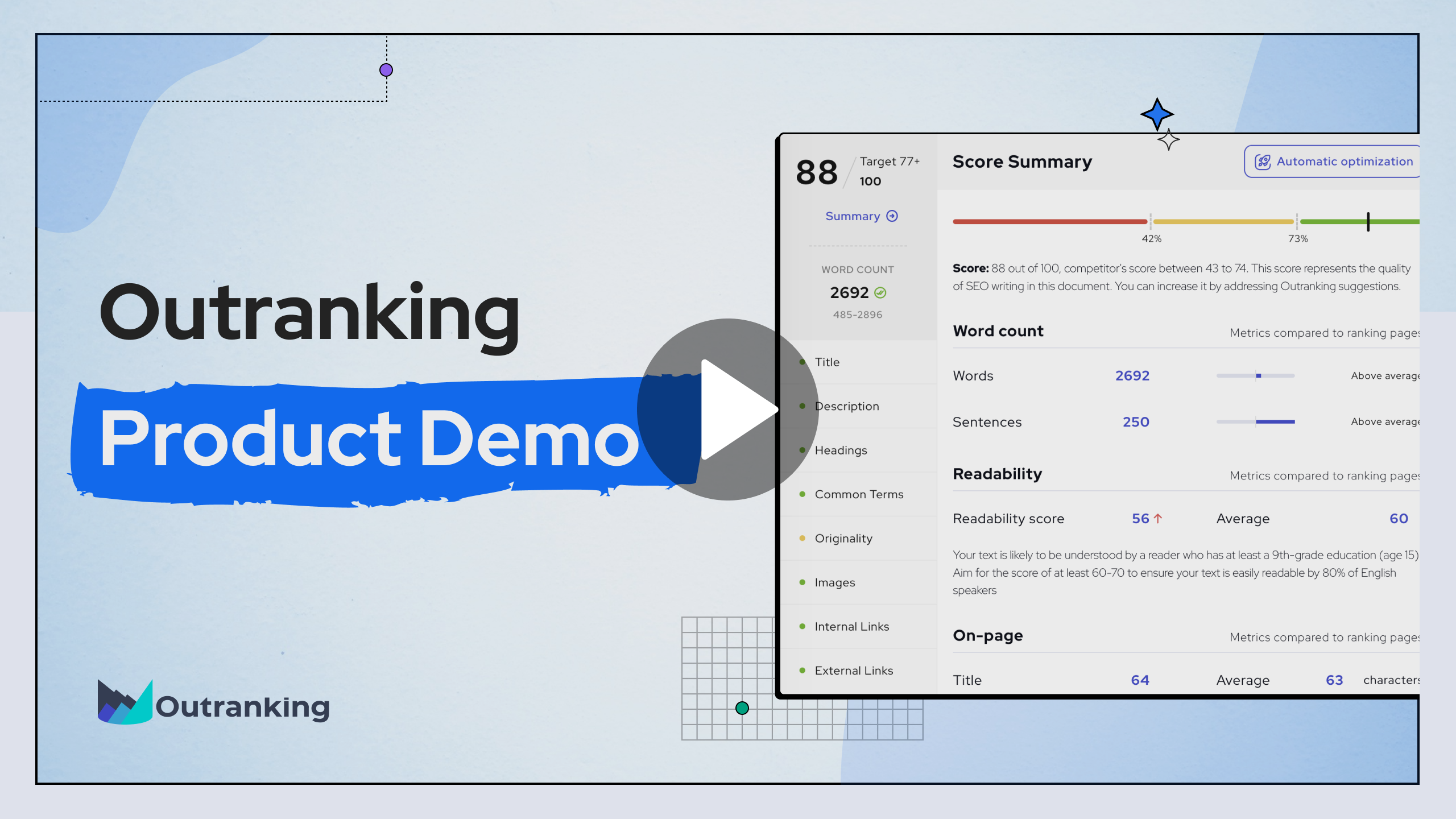
- Pricing
- Resources
- Sign In
- Get Started
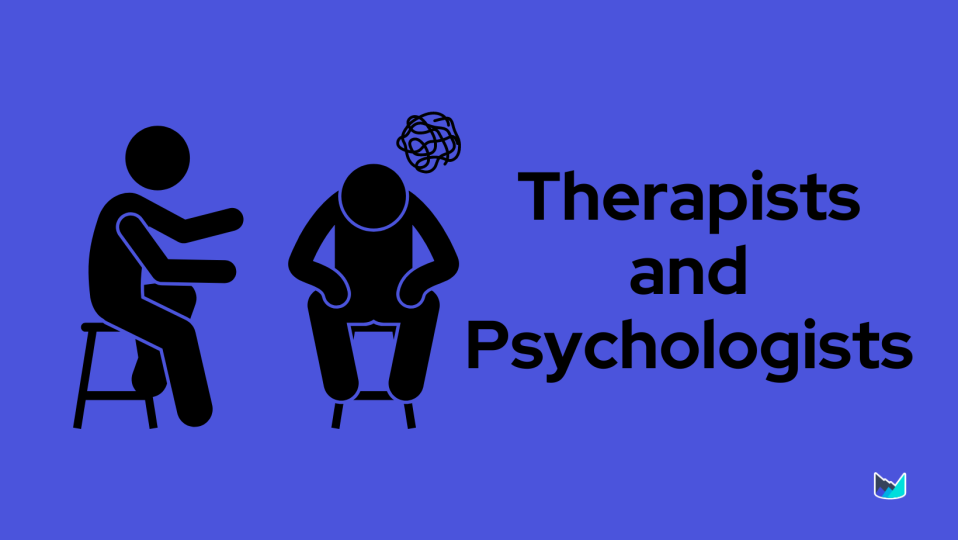
Table of Contents
In 2024, 53% of all website traffic came from organic searches. So, if you want your therapy services website to dominate the therapist’s industry, you have to focus on implementing the best SEO practices.
But you’ll also need a solid SEO content strategy to ensure your content aligns with the services and specialties you provide. But what other practices should you add to your SEO checklist? So, we have compiled the 12 ways therapists can improve their SEO game.
Table of Contents
Why Is SEO Important for Therapists and Psychologists?
Mental health services worldwide are becoming a highly saturated industry. So therapists and psychologists need a surefire way to attract and retain clients.
With the evolution of digital marketing, search engine optimization (SEO) has emerged as a crucial strategy for improving online visibility and increasing organic traffic. SEO involves optimizing your website and online content to rank higher in search engine results pages (SERPs) when relevant keywords are searched.
Here are some key aspects SEO can help therapists and psychologists with:
1. Prioritize Tasks
One of the main benefits of having an SEO content strategy is that it can help therapists and psychologists prioritize tasks and see measurable results. Your SEO strategy can let you know what topics and keywords you should target in your content.
From there, you can avoid spending time and resources on tasks that don’t matter to your website currently. This will also help your therapist services website attract more visitors who want to hear what you have to say about something that interests them.
2. Stay Focused
Having an SEO content strategy can help therapists and psychologists stay focused on their goals. When you have a plan in place, it’s easy to say no to non-essential tasks and projects. When you follow a good strategy, you can avoid distractions and focus on creating helpful, informative content that resonates with your target audience.
3. Increase Leads
Another significant benefit of SEO for therapists and psychologists is that it can increase the number of leads they generate. By creating high-quality content that addresses the concerns and queries of potential clients, therapists, and psychologists can attract more website visitors who are interested in what they have to offer. This can lead to an increase in client acquisition and ultimately, business success.
4. Become Search Engines’ Favorite
SEO can have a significant impact on the online presence of therapists and psychologists. By optimizing your website and online content for search engines, you can establish yourself as a thought leader in your field and build a strong online reputation. This can help you stand out from your competitors and attract more clients who are looking for expert advice and guidance.
How to Implement SEO for Therapist or Psychologist Websites
Before you start working on your therapy services website, you should have an overview of what you need to do to implement SEO effectively. The whole process can be summed up in thirteen steps:
For a practical guide on how to improve SEO for your website , follow these straightforward steps.
Step 1: Define your psychologist’s office core services to create your website architecture
Step 2: Make a list of keywords that align with the services you offer
Step 3: Cluster keywords in each psychology service area to determine the topics to create
Step 4: Create a content calendar and prioritize your SEO efforts
Step 5: Establish a content production process, SOPs, and content briefs, or hire an agency to help
Step 6: Create SEO-optimized content for service pages and blogs for your therapist or psychologist’s office website
Step 7: Optimize internal linking for your website
Step 8: Acquire backlinks and local references for your psychologist’s office website
Step 9: Optimize page speed and website experience
Step 10: Track rankings using Google Search Console
Step 11: Optimize your therapist’s office’s Local Google My Business account
Step 12: Focus on the ultimate goal — leads and conversions
Step 1: Develop A Website Architecture
The first step to implementing better SEO for a therapist or psychologist is understanding the core areas of their practice. By identifying the core offering areas, it becomes easier to conduct keyword research and develop a plan.
Breaking down the therapist or psychologist website architecture into core offerings and its extended list of sub-areas can be done by identifying the services they offer and the different areas within those services.
Here is an example of a table that lists the core service areas and its extended list of sub-areas for a therapist or psychologist:
| Core Service Areas | Extended List of Sub-Areas |
| Individual Therapy | Cognitive Behavioral Therapy, Dialectical Behavioral Therapy, Psychodynamic Therapy, Person-Centered Therapy, Mindfulness-Based Therapy |
| Couples Therapy | Emotionally Focused Therapy, Gottman Method Couples Therapy, Imago Relationship Therapy, Discernment Counseling, Narrative Therapy |
| Family Therapy | Structural Family Therapy, Strategic Family Therapy, Bowenian Family Therapy, Solution-Focused Brief Therapy, Narrative Therapy |
| Group Therapy | Support Groups, Psychoeducational Groups, Process Groups, Skills-Based Groups, Interpersonal Psychotherapy |
Here is a template of a therapist’s website architecture:
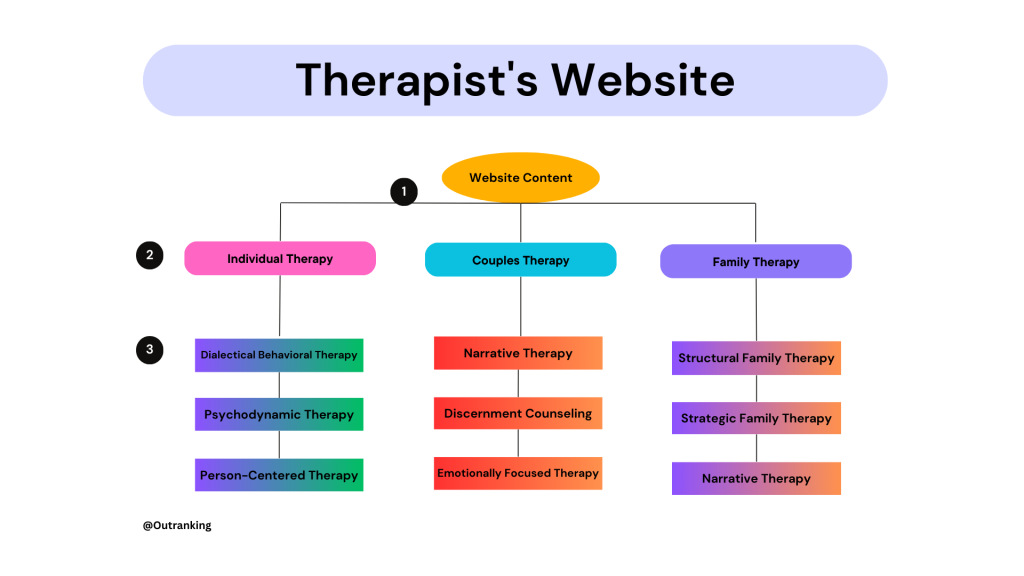
Step 2: Develop A Keyword Research Process
For your keyword research process, keep these three things in mind:
- Gather the list of keywords in each core area of your therapy-related website
- Repeat the keyword research step for each sub-area of focus within each core offering area
- Exclude irrelevant and outdated keywords to focus on analyzing the most important ones more efficiently
To perform keyword research for a therapist or psychologist’s website, we can use Semrush or Outranking.
Method 1: Semrush
- Enter “therapist” or “psychologist” as the keyword in the Semrush keyword research tool

2. Analyze the results and exclude irrelevant or outdated keywords
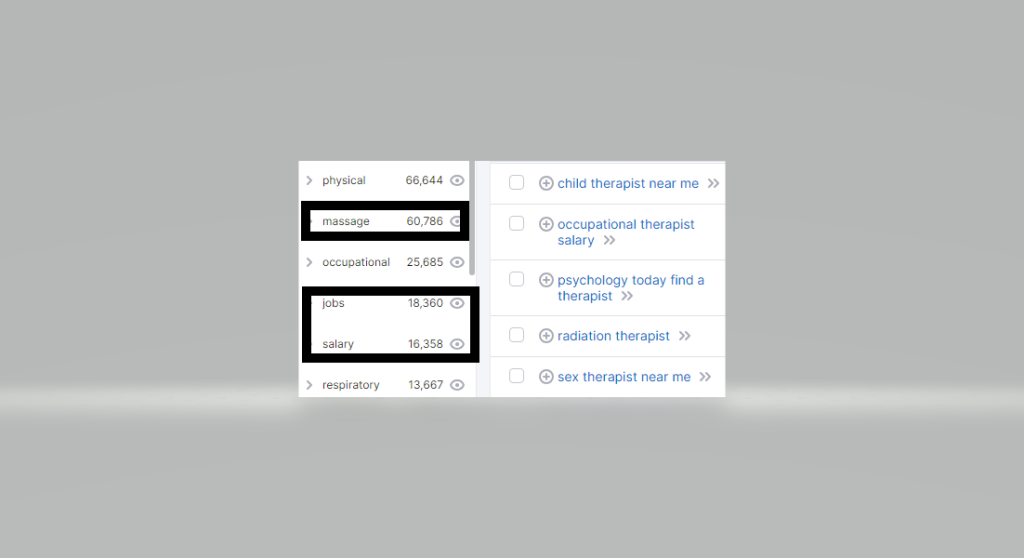
3. Download the CSV file containing the remaining keywords
4. Repeat this process for each core service area of the website, such as “anxiety treatment” or “couples therapy”
5. Combine all CSV files into one for easier management

Method 2: Outranking
Alternatively, you can use Outranking to gather and refine your keywords. Here are the steps to do so:
- Use Outranking’s available keyword generator and enter “therapist” or “psychologist”
- Analyze the results and refine the keywords
- Repeat this process for each core service area of the website
- Combine all refined keywords into one list for easier management
Step 3: Perform Keyword Clustering To Generate Topic Ideas
Keyword clustering is the process of arranging similar keywords together. It helps in identifying the most relevant and high-performing keywords for a therapist’s website’s content strategy.
Therapists and psychologists can benefit from keyword clustering as it can help them target the right audience and improve their website’s search engine rankings.
For instance, a therapist or psychologist’s keyword list might include keywords such as “anxiety therapy,” “ADHD Counseling”, “depression counseling practice,” “marriage counseling,” “child therapy,” and so on.
By using keyword clustering, these keywords can be grouped into clusters such as “mental health counseling,” “family therapy,” and “individual therapy.” This can help create targeted content for each cluster and improve your website’s visibility for relevant search queries.

But it’s also important to pick a primary keyword for each cluster. To do that, consider:
- Your ability to create better content than your therapist’s competitors
- The number of backlinks your competitors in the therapy industry have
- The knowledge gap or underserved area in the intent
- The target keyword’s volume and relevancy
- Your topical authority in the therapy industry
If you don’t have an in-house SEO team, consider hiring one. But if you don’t have the budget for an SEO team, you can use tools like Outranking. It can help you analyze your competitors’ coverage of a topic, measure your and your competitors’ topical authority, and check the therapy website’s competition’s minimum backlinks. Outranking’s keyword clustering tool can also be beneficial as it simplifies the process and provides valuable insights.
Step 4: Prioritize Your Therapy or Psychology Practice’s Content Calendar
Prioritizing keywords is very important to optimize the content on your website. To do that, create a list of primary keywords and groups. You can then use Outranking’s keyword “strategy topics and planner” page to map out a plan and schedule for your content.
Outranking can also help with prioritizing your keywords because it allows you to set importance for your keywords: High, Medium, or Low. For your therapist or psychologist website, you can use the table below:
| Priority | Keywords Containing | Why |
| High | Anxiety, Depression, Therapy | These keywords are crucial for your therapist or psychologist’s website as they define the core services offered and can help establish your website as a thought leader in the field. |
| Medium | Counseling, Mental Health, Self-Care | These keywords can place your therapist or psychologist’s website among many competitors and help attract potential clients. |
| Low | How-to and Educational Guides, Mindfulness, Stress Management | These keywords can define your therapist or psychologist’s website as a thought leader and support important pages for the flow of information. |
When you prioritize your whole list of keywords, you can ensure your content is optimized for the most important keywords and topics. This can help attract potential clients and establish your website as a reliable source of information on mental health.
Step 5: Create A Content Production Process
As a therapist or psychologist looking to implement SEO on your website, you should establish a content creation and optimization process. This way, your SEO strategy will go as planned and yield your desired results. Here are two expert tips to help you note down a thorough content creation and optimization process:
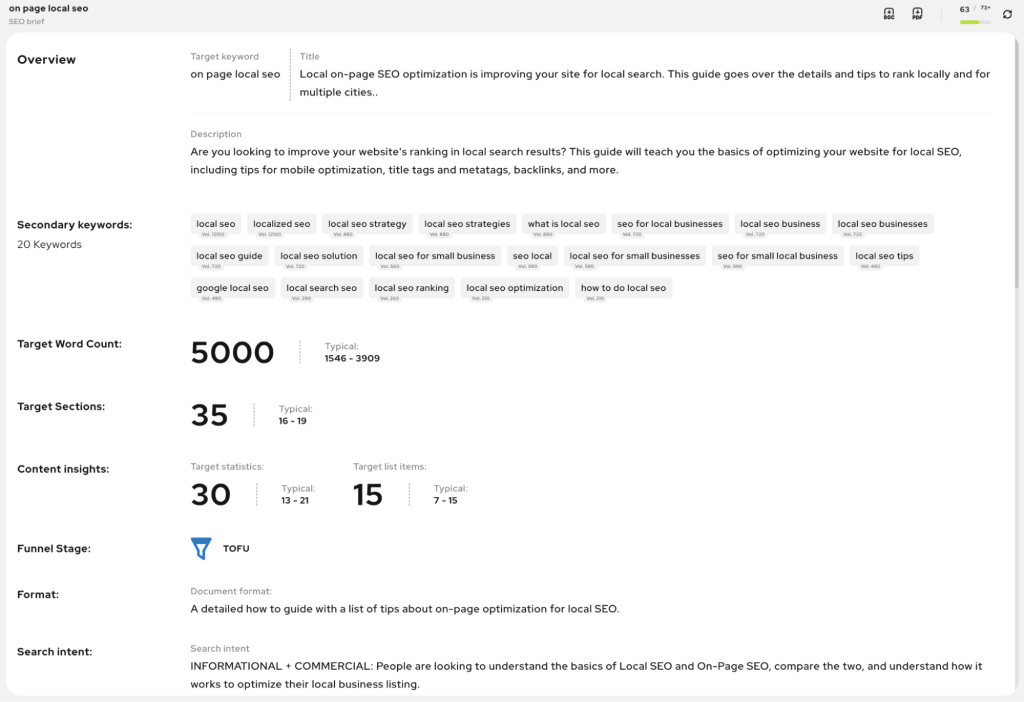
1. Create Solid Content Briefs
Before you start creating content, you should have a clear understanding of what you want to achieve with your therapy website’s content. An SEO content brief can help you with that. This document will put together all your goals, target audience, and key messaging.
2. Set up a Workflow for Tasks
A well-defined and optimal workflow will help you stay organized and focused on your therapy website’s content creation process. With a logical workflow, you can move between all steps in the process correctly. This way everything will be done on time, without delays. This will also help you save time and ensure you only put out high-quality content.
Using Outranking’s content planner can be highly beneficial for therapists or psychologists looking to implement SEO on their websites. Outranking’s platform offers predefined workflow status that can be customized to fit your needs, allowing you to keep track of every document with a customized workflow. Additionally, Outranking’s Kanban view allows you to see what stage your therapy documents are in at a glance, making it easy to stay on top of your content creation process.
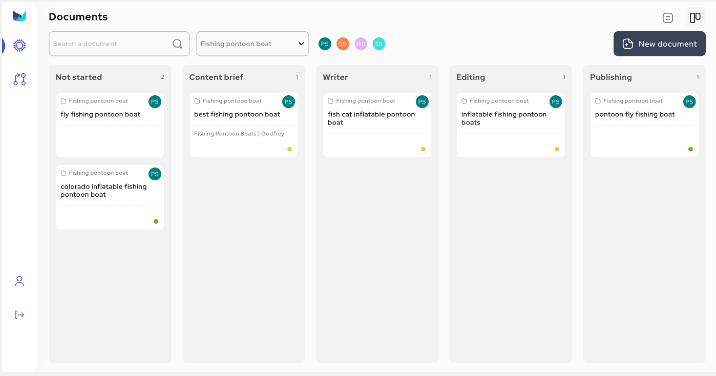
Step 6: Create SEO-Optimized Content For Your Webpages
Creating SEO-optimized content for each service page and blog is crucial to ensure your therapy or psychology practice is investing in content that will yield results. By optimizing your content, you can improve your therapy website’s organic reach, attract more traffic, and ultimately, grow your client base.
This is especially important for busy therapists or psychologists who have limited time and may not be familiar with SEO best practices. Hiring an agency, consultant, or freelancer can be a great option, but it can also be expensive. That’s where Outranking’s SEO content optimization and writing platform comes in.
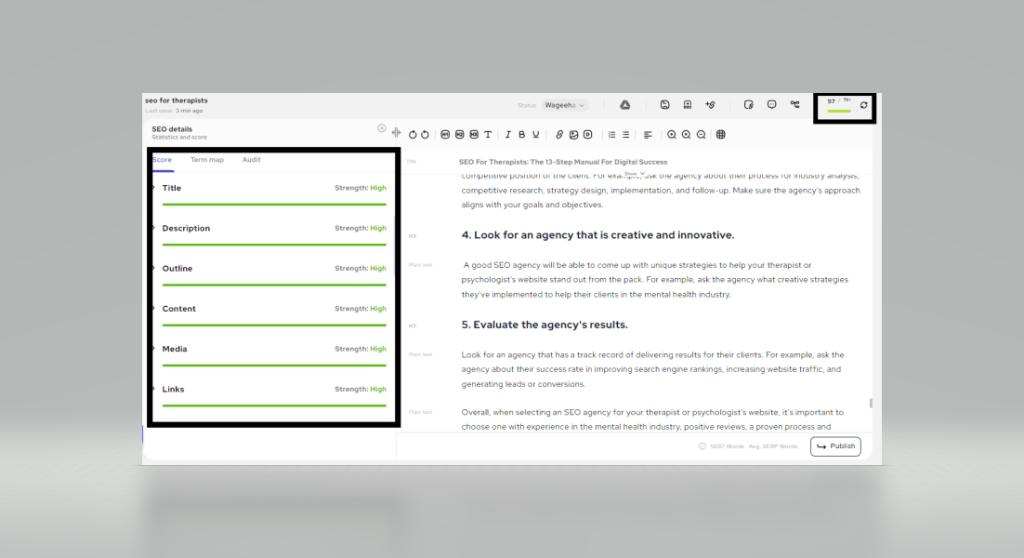
With its advanced features and real-time optimization capabilities, Outranking makes it easy to create content that ranks each and every time. Its comprehensive interface provides suggestions with real-time on-page SEO capabilities on how to improve your meta tags including the title tag and meta description tag, outlines and headings, word count, common NLP terms, unique entities, lists and tables, statistics, image tags, alt text and alt tags, internal and external links, and even featured snippets.
Step 7: Optimize Internal Linking
Did you know you can still optimize your content even after you publish it? And it’s actually recommended you do that! Optimizing existing pages with better internal linking is a great way to improve the overall traffic for your therapy website.
Internal linking optimization simply allows you to borrow authority from pages that are already ranking — and give that to pages that need to rank better for a specific keyword. To optimize your psychology practice’s website, look for pages that are ranking in the top 4-14 positions.
These pages should have keywords related to your practice’s services. Outranking can connect to Google Search Console to identify your therapy website’s web pages that are already ranking and show internal linking opportunities.
It can then suggest internal linking opportunities for pages that need to rank better for specific keywords. This effective strategy can help improve the website’s performance and increase traffic for search engines like Google.
Step 8: Perform Local SEO By Gaining Citations And Backlinks
Acquiring local citations and backlinks is crucial for the local SEO of any therapist or psychologist website. Local citations are mentions of your business’s name, address, and phone number (NAP) on other websites. These citations help search engines verify the existence, credibility, authoritativeness, legitimacy, and trustworthiness of your business.
Backlinks are the referrals that landed on your site without searching your therapy website’s domain name. When the same details appear across many relevant and trusted websites, the Google search engine gains confidence that your therapy service exists and operates as it should.
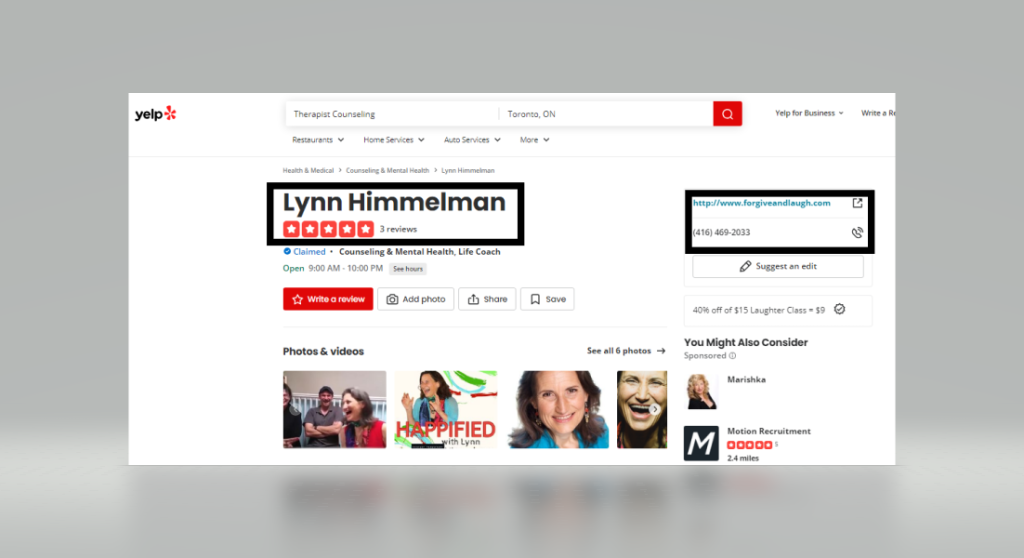
But does it really matter? Yes! Search algorithms actually favor local citations — they’re the fifth most important ranking signal for local queries. Here are two ways local citations can help your therapist or psychologist practice’s local SEO:
- People are more likely to find your business in directories. Generally, people don’t use Google to find local therapists. They turn to Yelp, Yellow Page, or even directories like Psychology Today.
- Business directories dominate search engine results for local queries. If someone googles “therapist in [city name]”, they’ll likely get a business directory that lists different therapists.
So getting listed with these directories can be a great help for your therapy practice’s online visibility.
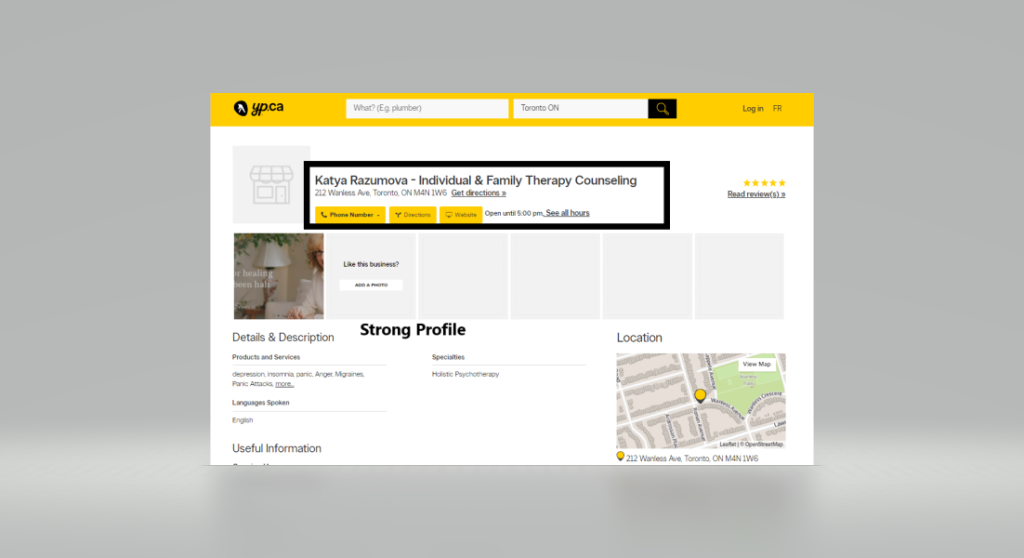
Citations come in two types: structured and unstructured. Structured citations list the NAP of a business and are usually found on therapy directories listings and social media profiles. On the other hand, unstructured citations are contextual mentions of a business and can be found in blog posts, forum posts, or as a result of press mentions.
To acquire local citations, therapists, and psychologists should follow these four steps:
- Get listed with the ‘big three’ data aggregators: Acxiom, Data Axle, and Localeze. These data aggregators distribute business data to a wide range of directories and websites.
- Submit to other core sites: This includes popular directories like Google My Business, Yelp, and Bing Places.
- Submit to popular industry and local sites: This includes directories and websites that are specific to the therapist or psychologist’s industry or location. For example, Psychology Today is a popular directory for therapists and psychologists.
- Pursue unstructured citations: This involves reaching out to bloggers, journalists, and other websites to get contextual mentions of your business.
Here’s a table with a list of data aggregators and websites therapists and psychologists should get citations from:
| Data Aggregator | Websites to Get Citations From |
| Acxiom | Yellow Pages, SuperPages, CitySearch |
| Data Axle | Local.com, Chamber of Commerce, Manta, Facebook, LinkedIn, Instagram |
| Localeze | Foursquare, TripAdvisor, Apple Maps |
Step 9: Optimize Page Speed and Website Experience
Page speed is a critical aspect of rankings in 2024. If your therapist practice’s website is slow, that negatively impacts user experience and engagement. A slow therapy website can also lead to increased bounce rates and decreased conversions, ultimately affecting your website’s search engine rankings. You should also ensure the mobile-friendliness of your site.
To quickly optimize page speed and website experience for therapist or psychologist websites, you can use better and lighter themes available on CodeCanyon and plugins like Nitropack for WordPress.
Step 10: Track Rankings Using Google Search Console
As a therapist or psychologist, you should absolutely connect to Google Search Console and track your website’s ranking to ensure your potential clients can easily find you online. By monitoring your website’s performance using Google Search Console, you can identify areas for improvement and make informed adjustments to enhance your online visibility. You should also consider using Google Analytics which tracks rankings for sites, mobile applications, and web applications.
Here’s a table that shows how to interpret the website ranking data and what actions to take:
| Ranking | Interpretation | Action |
| 1-3 | Your website is ranking well for the targeted keywords | Keep up the good work and continue to optimize your therapy services website |
| 4-10 | Your website is ranking on the first page of the Google search engine, but you still have some room for improvement | Analyze your therapy services website content and optimize it for better ranking |
| 11-20 | Your website is ranking on the second page of Google | Improve your therapy services website content and optimize it for better ranking |
| >20 | Your site is not ranking well for the targeted keywords | Re-evaluate the content and optimize it for better rankings using Google Search Console |
Step 11: Leverage Google Business Profile
Google My Business is an unpaid service that allows businesses to provide more information about their business when it appears in searches, including photos, videos, business hours, and location.
Here are some practical steps you can take to optimize your therapist practice’s Google My Business listing:
- Claim and verify your listing: The first step to optimizing your Google My Business listing is to claim and verify it. This involves creating a Google account and submitting your business information to Google for verification.
- Optimize your business information: Once your listing is verified, make sure your business information is complete and accurate. This includes your business name, address, phone number, site name, and business hours.
- Choose the right categories: Selecting the right categories for your business is crucial for local search optimization. For example, a therapist or psychologist may choose categories such as “Mental Health Service” or “Counseling Service”.
- Add photos and videos: Adding photos and videos to your listing can help potential clients get a better sense of your business. For a therapist or psychologist, this may include photos of your office or videos explaining your approach to therapy.
- Encourage reviews: Positive reviews on your Google My Business listing can help improve your local search ranking.
- Respond to reviews: Responding to reviews, both positive and negative, shows that you value your clients’ feedback and can help improve your local search ranking.
- Use Google Posts: Google Posts allow you to share updates, promotions, and events directly on your Google My Business listing. For a therapist or psychologist, this may include information about upcoming workshops or new services offered.
- Monitor your listing: Regularly monitoring your Google My Business listing can help ensure your information is accurate and up-to-date. This includes checking for and responding to suggested edits and updating your information as needed.
It’s important to note that optimizing your Google My Business listing can be a complex process, and it may be beneficial to hire an agency or professional to ensure that everything is done correctly.
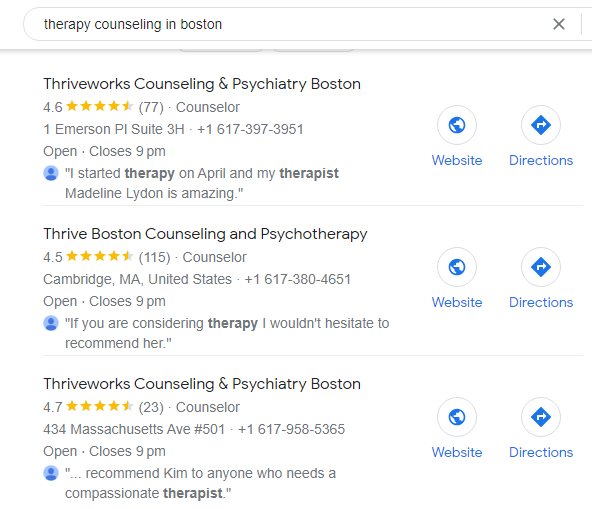
Step 12: Focus on the Ultimate Goal: Leads and Conversions
Most sites focus on organic traffic rather than leads and conversions because organic traffic is the foundation of a successful online presence. Without traffic, leads and conversions will be nonexistent.
However, traffic alone isn’t enough, because the key thing is to convert that traffic into leads, and eventually new clients. For example, a short-tailed keyword like “therapy” may bring in lots of unrelated traffic, but a more specific and long-tail keyword like “cognitive behavioral therapy for anxiety” may bring in a much more targeted audience for a therapist or psychologist.
It’s important to focus on leads and conversions because ultimately, the goal of any business is to generate revenue and grow. Traffic is just a means to an end, and it’s the leads and conversions that will help achieve that end.
How to Evaluate an Agency to Help with SEO for Your Therapy or Psychology Practice
It’s not enough to just pick an agency for SEO. You should ensure you pick the right agency for your therapist practice. Here’s how you can know whether you’re making the right choice:
Expertise, Reviews, and Results
When selecting an SEO agency to help with your therapist or psychologist’s site, it’s important to evaluate their expertise, reviews, and results. Here are some tips on how to do so:
1. Look for an Agency with Expertise in the Mental Health Industry
An agency that has worked with therapists or psychologists before will have a better understanding of the competitive landscape and be more creative in its approach to strategy design. Ask the agency if they have experience working with mental health professionals and if they can provide case studies or examples of successful campaigns.
2. Check the Agency’s Reviews and Testimonials
Look for reviews from clients in the mental health industry to see if the agency has a track record of delivering results. For example, check the agency’s Google My Business page, Yelp, or other review sites to see what clients have to say about their experience working with the agency.
3. Ask About the Agency’s Process and Approach
A good SEO agency will employ a proven process and customized approach tailored to the unique competitive position of the client. For example, ask the agency about its process for industry analysis, competitive research, strategy design, implementation, and follow-up. Make sure the agency’s approach aligns with your goals and objectives.
4. Look for a Creative and Innovative Agency
A good SEO agency will be able to come up with unique strategies to help your therapist or psychologist’s website stand out from the pack. For example, ask the agency what creative strategies they’ve implemented to help their clients in the mental health industry.
5. Evaluate the Agency’s Results.
Look for an agency that has a track record of delivering results for their clients. For example, ask the agency about their success rate in improving search engine rankings, increasing website traffic, and generating leads or conversions.
A therapist or Psychologist SEO Services Offered
Experience matters when it comes to success in digital marketing, especially SEO. Look for an agency with a minimum of 5 to 10 years of real-world experience, preferably working with websites in the mental health or healthcare industry.
This experience will also allow the agency to customize its approach to fit your needs. True, they’ll follow a method, but they’ll adapt that method based on your goals, clientele, region, and other factors.
Contract Duration and Flexibility
Look for an agency that offers flexible contract durations, as SEO is an ongoing process that requires continuous effort. A good agency will offer monthly or quarterly contracts that can be adjusted as needed based on the results achieved. Avoid agencies that require long-term contracts with no flexibility.
You should also choose an agency that values communication and transparency. They should provide regular updates on progress and be available to answer any questions or concerns you may have. Look for an agency that assigns a dedicated account manager who will be your main point of contact throughout the process.
Need an SEO Strategist to Set up the Plan and Answer all the Pressing Questions?
If you’re looking to improve your website’s search engine rankings, it’s important to have a solid SEO plan in place. However, creating an effective SEO strategy can be a daunting task, especially if you’re not familiar with the technical side of things.
That’s where an SEO consultant can be incredibly helpful. By hiring an SEO consultant like Outranking’s SEO consultant and strategist, you can get expert guidance on how to optimize your website for search engines. We can help you with strategy, planning, and execution to ensure everything goes smoothly and you get the right results.
With our help, you can rest assured that your website is fully optimized for search engines and that you’re getting the most out of your online presence.
Contact Outranking today and start the journey to success.


